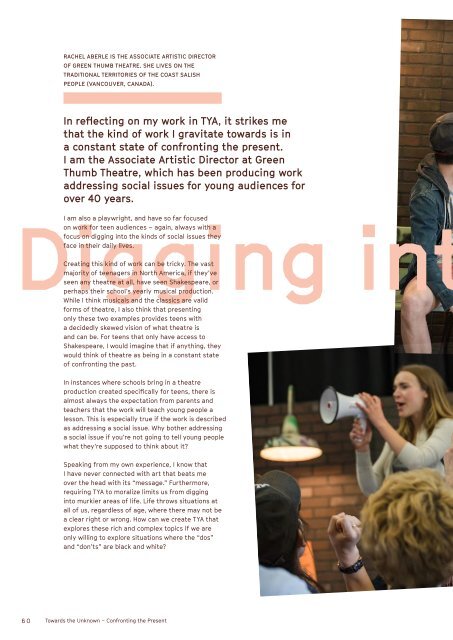ASSITEJ Magazine 2019
This is the annual ASSITEJ magazine, launched during the ASSITEJ Artistic Gathering 2019 in Kristiansand (Norway). It contains high-quality articles on theatre for young audiences from all corners of the world!
This is the annual ASSITEJ magazine, launched during the ASSITEJ Artistic Gathering 2019 in Kristiansand (Norway). It contains high-quality articles on theatre for young audiences from all corners of the world!
You also want an ePaper? Increase the reach of your titles
YUMPU automatically turns print PDFs into web optimized ePapers that Google loves.
RACHEL ABERLE IS THE ASSOCIATE ARTISTIC DIRECTOR<br />
OF GREEN THUMB THEATRE. SHE LIVES ON THE<br />
TRADITIONAL TERRITORIES OF THE COAST SALISH<br />
PEOPLE (VANCOUVER, CANADA).<br />
In reflecting on my work in TYA, it strikes me<br />
that the kind of work I gravitate towards is in<br />
a constant state of confronting the present.<br />
I am the Associate Artistic Director at Green<br />
Thumb Theatre, which has been producing work<br />
addressing social issues for young audiences for<br />
over 40 years.<br />
I am also a playwright, and have so far focused<br />
Digging int<br />
on work for teen audiences – again, always with a<br />
focus on digging into the kinds of social issues they<br />
face in their daily lives.<br />
Creating this kind of work can be tricky. The vast<br />
majority of teenagers in North America, if they’ve<br />
seen any theatre at all, have seen Shakespeare, or<br />
perhaps their school’s yearly musical production.<br />
While I think musicals and the classics are valid<br />
forms of theatre, I also think that presenting<br />
only these two examples provides teens with<br />
a decidedly skewed vision of what theatre is<br />
and can be. For teens that only have access to<br />
Shakespeare, I would imagine that if anything, they<br />
would think of theatre as being in a constant state<br />
of confronting the past.<br />
In instances where schools bring in a theatre<br />
production created specifically for teens, there is<br />
almost always the expectation from parents and<br />
teachers that the work will teach young people a<br />
lesson. This is especially true if the work is described<br />
as addressing a social issue. Why bother addressing<br />
a social issue if you’re not going to tell young people<br />
what they’re supposed to think about it?<br />
Speaking from my own experience, I know that<br />
I have never connected with art that beats me<br />
over the head with its “message.” Furthermore,<br />
requiring TYA to moralize limits us from digging<br />
into murkier areas of life. Life throws situations at<br />
all of us, regardless of age, where there may not be<br />
a clear right or wrong. How can we create TYA that<br />
explores these rich and complex topics if we are<br />
only willing to explore situations where the “dos”<br />
and “don’ts” are black and white?<br />
60 Towards the Unknown – Confronting the Present



